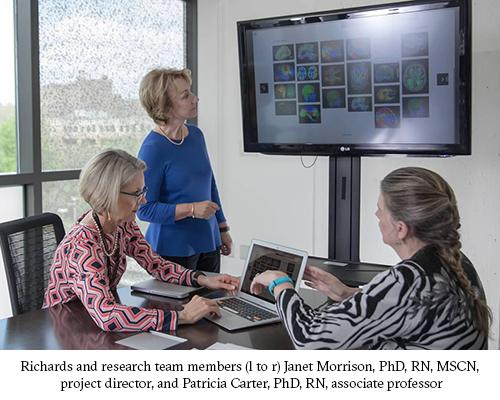
Could it be that something as simple as sleep can slow or even roll back the effects of cognitive impairment and slow the progression of Alzheimer’s disease? Kathy Richards, PhD, RN, FAAN, and research scientist at UT Austin’s School of Nursing, thinks so. And because of her more than 20 years of experience in translational sleep and aging research, the National Institute on Aging encouraged her to apply for funding to look into the role of sleep in preventing brain damage.
Early in her career, Dr. Richards conducted clinical trials involving exercise and social activity to improve sleep in persons with Alzheimer’s disease who lived in nursing homes. Finding it difficult to measure their sleep accurately, she used polysomnography, a sleep test performed in sleep laboratories to study sleep and diagnose a variety of sleep disorders.
“We conducted more than 200 home and nursing home polysomnography studies in people with Alzheimer’s disease,” Richards said. “I was surprised to find that over 60 percent of them had rather severe obstructive sleep apnea and began to wonder if the sleep apnea came before or after the Alzheimer’s disease, and if identifying and treating apnea early in the trajectory of memory loss might help people to retain their memory.”
In 2011, Richards received a $2.3 million grant from the National Institute on Aging to investigate her hypothesis that treatment of obstructive sleep apnea might improve memory and delay cognitive decline in persons with mild cognitive impairment.
After working with the 83 participants enrolled in the Memories 1 study, her team found that consistently using a continuous positive airway pressure (CPAP) machine for sleep apnea provided significant and clinically important cognitive and functional benefits for older adults with mild cognitive impairment and obstructive sleep apnea, a health condition causing sleep disturbance, pauses, or cessation of breathing during sleep, and dangerous drops in oxygen in the blood and brain. The result was so impressive she broadened the study.

“At the end of the Memories 1 study, we saw from the cognitive testing that those who used CPAP were often better,” Richards said. “We began to think that it’s possible that something as easy as taking care of your sleep health may slow progression of dementia and improve memory.”
In Memories 2, which was funded by the National Institute on Aging for $9.7 million, Richards and her research colleagues at the University of Pennsylvania will recruit 450 individuals between the ages of 55 and 75 with mild cognitive impairment from Austin, Philadelphia, Charlottesville, Virginia; and St. Louis, Missouri. Collaborating universities are St. Louis University and the University of Virginia.
Mild cognitive impairment is a transitional stage between normal memory and Alzheimer’s disease. Richards estimates that about three-quarters of the participants in this new study will have obstructive sleep apnea and one-quarter will not.
Those with sleep apnea will receive CPAP to treat the apnea and a series of motivating phone calls from project staff to encourage them to successfully use their CPAP device. The control group without sleep apnea will receive motivating phone calls on health topics. Everyone in the study will undergo memory testing, a brain MRI and an amyloid PET scan to establish a baseline. They will repeat the memory testing and brain MRI after one year.
“Although we want patients to use CPAP all night, every night, at least four hours is needed for a therapeutic response. Scientists and clinicians commonly define CPAP adherence as at least four hours of use each night,” Richards said. “The main goal of the study is to determine if CPAP adherence will delay or perhaps even reverse progression toward Alzheimer’s disease.”
In addition to multiple-principal investigators Dr. Nalaka Gooneratne and Dr. David Wolk at the University of Pennsylvania, Richards recruited Dr. Patricia Carter at the UT Austin School of Nursing and Dr. Nick Bryan at Dell Medical School as coinvestigators in the trial.
Richards is also co-principal investigator of a $3.9 million, five-year award from the National Institute on Aging designed to improve treatment of nighttime agitation in persons with Alzheimer’s disease.
“The precision medicine method we are using in that study tailors treatment to the specific sleep disorder restless legs syndrome that causes discomfort and an inability to sit or lie still in the evening and night,” Richards said. “We hypothesize that restless legs syndrome may be a cause for nighttime agitation and sleep disturbance in people with Alzheimer’s.”